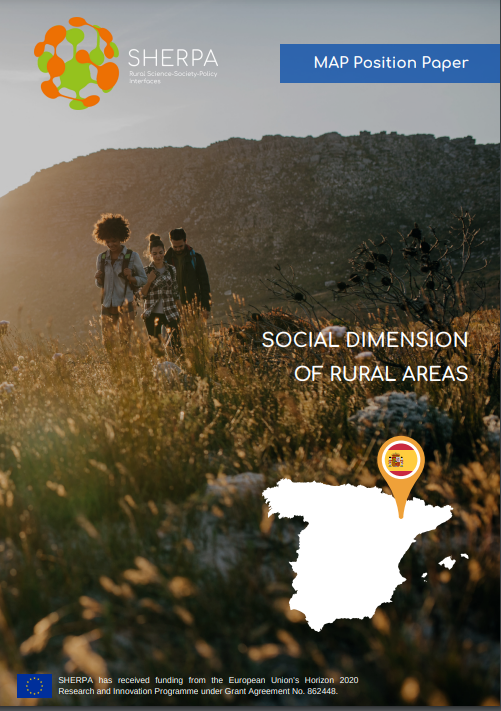Recientemente, en el marco del Proyecto SHERPA, las investigadoras del CEIGRAM Bárbara Soriano, Isabel Bardají y Carina Folkeson han publicado el MAP Position Paper para la región de Aragón (España): social dimension of rural areas.
A continuación, un breve resumen y los mensajes clave del estudio:
Previous studies have found that there is a low level of associative culture, weak social networks, lack of social venues, and low interest in public participation in rural areas in Aragón. At the same time, migrant population is becoming a challenge in rural areas as in some of the Aragon’s counties they represent more than 25% of the population with a low inclusion level. This position paper focuses on the assessment of the needs related to social relationships and social inclusion in rural areas in Aragón as relevant components of the wellbeing in rural areas.
Drawing from literature review, surveys of the rural population, and discussions among MAP’s members, the key messages of the IDRA position paper are that, although the quality of life in rural areas in Aragón is considered to be high by survey participants, many aspects related to the social dimension of rural development still deserve additional attention. Social relationships and social inclusion are among the most important aspects that contribute to the quality of life, but there is a need to strengthen social commitment through collective actions, enhance social integration of different generations and support work/free time conciliation, support capacity building of social agents and guarantee the social inclusion of migrant population.
To address these needs, additional limitations need to be overcome in parallel such as access to affordable housing, transport and mobility improvements, and increased availability of qualified jobs. In addition, in order to strengthen the social conditions of rural Aragón, it would be beneficial to ensure that the legislation developed is adapted to rural areas conditions (rural proofing), that appropriate control procedures are put in place, and that the coordination among the administrative bodies concerned increases.
Over the past decade, the Local Action Groups (LAGs) have become the principal social actors with the highest potential to overcome the social needs in rural areas in Aragón, as they count on a strong, participative social basis. However, LAGs do not have neither the structure nor the capacitation and funds to address social issues in a proper way, without additional support and coordination by responsible authorities.
The policy recommendations from the members of the MAP focus on two main areas:
- Clearly define in social legislation the objectives, actions, and budgets dedicated to the diversity in rural areas (rural areas positive discrimination), accompanied by instruments for the evaluation of the impact of social policies. The legislative adaptation to rural areas and territorial approach also refers to other national regulations such as entrepreneurship and EU funds such as the Europeans Social Fund.
- Improve the role of the LAGs as main instrument to deal with the needs related to social relationships and inclusion. To this end, MAP’s members provide several recommendations such as: i) to define the social objective for Leader at EU level more clearly; ii) to improve the multi-fund solution; iii) to promote results-oriented programs; and iv) to increase the support for projects aiming at intangible assets.
MAP’s members identified the following research opportunities: 1) mechanisms on how to adapt social legislation to the needs of rural areas; 2) double direction knowledge transfer methods; 3) qualitative and quantitative dynamic models flexible enough to understand the functioning and relationships in the diverse rural areas; 4) understanding the decision-making of the actors in the rural areas and 5) methods for the evaluation of impact of social policies in rural areas; 6) evaluation of organisation of social politics in rural areas in Spain and 7) overcoming the significant data gaps at local level.
Participan también en el estudio como colaboradores José María Sumpsi, investigador del CEIGRAM, y Noe Vinial, estudiante de L’Institut Agro Dijon, quien hasta hace poco estuvo de estancia en el CEIGRAM trabajando con la Profesora Bárbara soriano.
Puedes descargar el estudio completo aquí: MAP Position Paper para la región de Aragón (España): social dimension of rural areas

